The aim of this article is to discuss the use of Abilify (generic name: aripiprazole) as a treatment for people with Fragile X syndrome (FXS). As an “off-label” prescription, Abilify targets behaviors such as irritability, aggression, self-injury and severe tantrums.
Read moreautism
Brain Organoids and Therapeutic Development for Fragile X and Other Rare Diseases
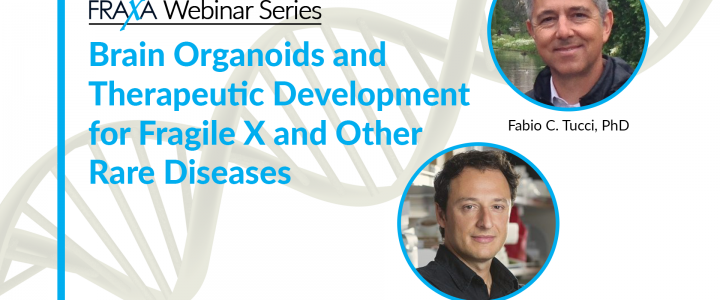
This is the first in a series of webinars focused on current topics in Fragile X research. In this webinar we hear from Alysson R. Muotri, PhD, Professor at University of California San Diego Stem Cell Programand Fabio C. Tucci, PhD, Chief Operating Officer and co-founder at Epigen Biosciences, Inc.
Read moreScientists Find a New Way to Reverse Symptoms of Fragile X
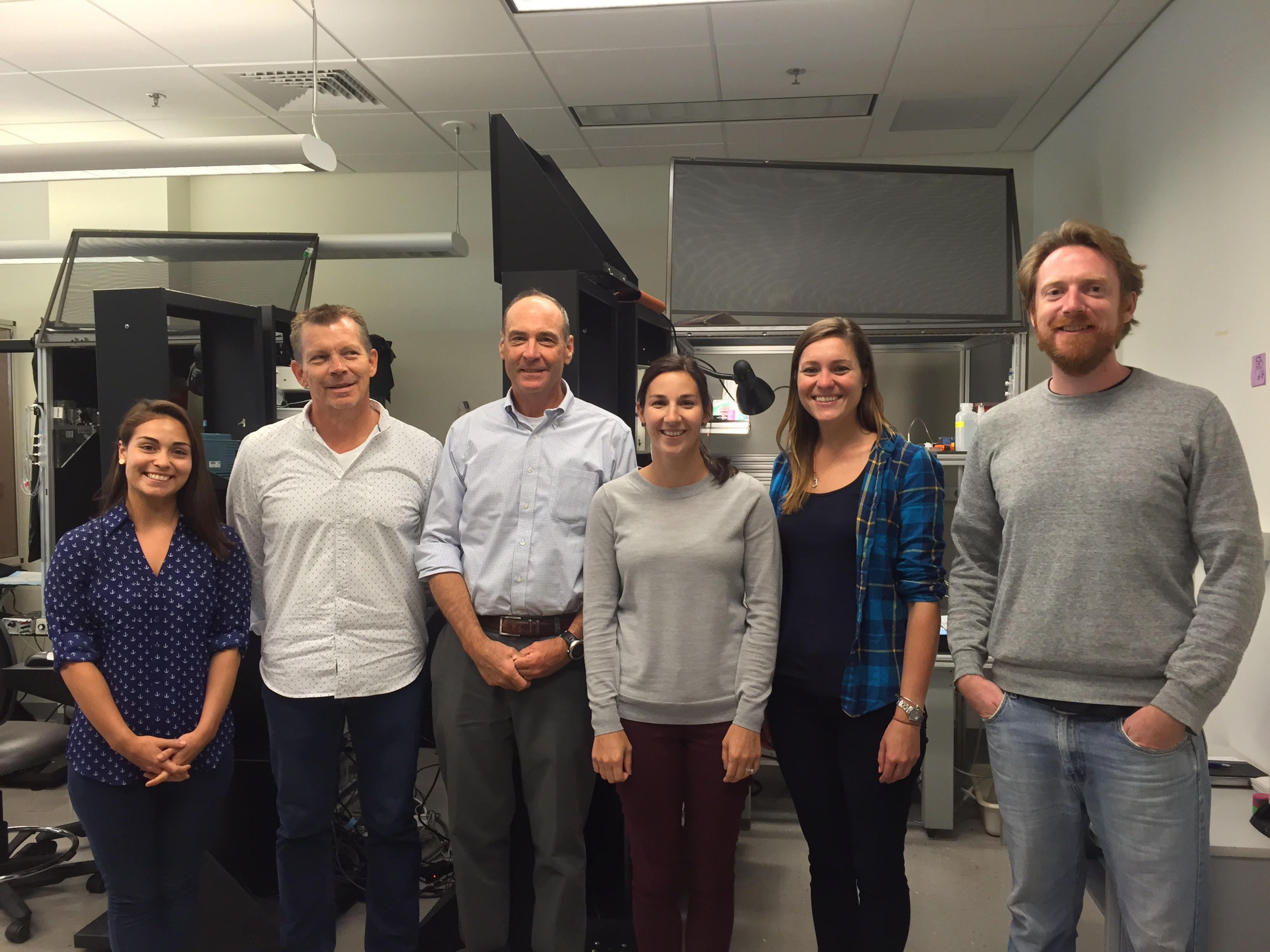
FRAXA Investigator and MIT Professor Mark Bear and his colleagues have identified a valuable new target for Fragile X therapeutics: GSK3 alpha. Several FRAXA research teams previously identified GSK3 beta as a treatment target for Fragile X. The catch is that, so far, GSK3 beta inhibitors have proven too toxic for regular use. Dr. Bear’s new discovery opens up the possibility of developing more selective compounds with less toxicity and fewer side effects. Interestingly, lithium inhibits both GSK3 versions – alpha and beta.
Read moreDrug Repurposing for Rare Disease and the Future of Health – The Genetics Podcast

In this double-bill episode of The Genetics Podcast, Dr. Patrick Short talks to two key rare disease researchers in the field: Dr. Bruce Bloom, CCO of Healx, and Dr. Mike Tranfaglia, CSO of FRAXA. Both draw on their wide-ranging personal and professional experiences to discuss the successes and opportunities of drug repurposing, the power of using machine learning, and the work they’ve been doing to aid in finding effective treatments for Fragile X.
Read moreConsidering Available Drugs for Fragile X: My Favorite Combination (So Far)

Which of the available drugs are best for fragile X? We tend to think of drugs according to their primary activity in the body, but very few drugs are totally selective and specific. There are differences between drugs in any given class, and these differences may be critical. Most drugs have “off-target” effects which are usually considered side effects, and it is these side effects which can have key advantages, in some cases.
Read moreLess Active Immune System Evident in Fragile X Patients, Study Suggests

People with Fragile X syndrome are more likely to develop infections, but are less susceptible to autoimmune disorders than the overall population, a new study found. Taken together, this suggests that the immune system is underactive in this patient population. The study, titled, “The phenotypical implications of immune dysregulation in Fragile X syndrome,” was published in the European Journal of Neurology.
Read moreResults Reported: Using EEG Responses to Sound for Fragile X Drug Discovery
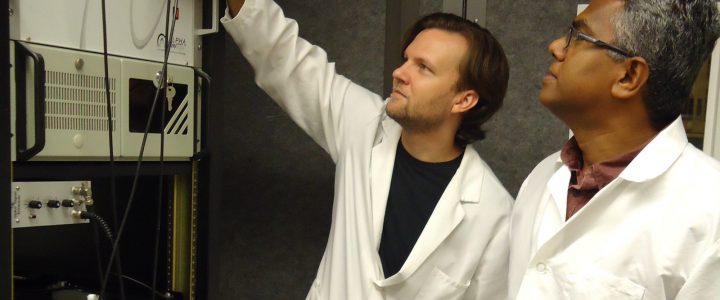
Jonathan Lovelace, a FRAXA funded Postdoc at UC Riverside, has made some exciting EEG findings over the past few years studying auditory hypersensitivity in mice and therapeutic drug treatments. A big obstacle in FXS research has been establishing reliable, unbiased, and translation relevant biomarkers that can be used to determine the effectiveness of therapies. One of the most important discoveries they have made is the striking similarity in EEG biomarkers between mice and humans.
Read moreFRAXA Biotech Games, It Can Only Happen in an Open Community

The FRAXA Biotech Games exploded onto Cambridge Crossing with a capacity crowd. What was immediately obvious was the genuine camaraderie and mutual support of the biotech community and its many vendors to help raise awareness of and funds for research on Fragile X, the most common inherited cause of autism and intellectual disabilities.
Read moreNH Fragile X Awareness Day Proclaimed at July Jam Fundraiser
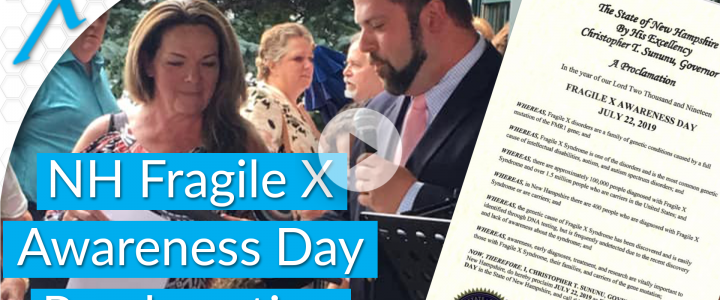
On July 22, 2019, the Fragile X July Jam in Derry, NH, raised over $6000 for FRAXA Research Foundation, to fund research to find effective treatments and ultimately a cure for Fragile X syndrome. Governor Chris Sununu’s policy director D.J. Bettencourt read an official proclamation calling for awareness of, and research on, Fragile X.
Read more20 Landmarks Will Light Up for Fragile X Awareness Day

Newburyport, MA (July 15, 2019) — Today, FRAXA Research Foundation announces that 20 buildings, bridges and landmarks across the United States and Canada will be illuminated teal on Monday, July 22, to celebrate International Fragile X Awareness Day. The goal of the initiative is to raise awareness of Fragile X syndrome, the most common inherited cause of autism and learning disabilities worldwide.
Read moreA Day in the Lab with FRAXA Investigator Dr. Tue Banke

Recently Laurie Bowler and her 19-year-old son Casey, who has Fragile X syndrome, visited FRAXA research grant recipient Dr. Tue Banke at his University of Washington laboratory. We hope you enjoy Laurie’s wonderful description of their adventure! FRAXA awarded $90,000 to Dr. Banke to study the Developmental Profile of Glutamatergic Synapses in Fragile X.
Read moreFXS Patients’ Social Deficits are Linked to Social Anxiety, Eye-tracking Study Says

Dr. Craig Erickson and colleagues at the University of Cincinnati used eye-tracking technology to understand sociability in Fragile X syndrome. This study affirms what so many parents, caretakers, and educators suspect: people with fragile X want to be social, and it is anxiety – not lack of interest – which usually hold them back. If anxiety could be reduced, more sociability would likely follow. Dr. Erickson is a Fragile X expert and FRAXA investigator who is currently conducting a Fragile X clinical trial of an investigational new drug.
Read moreScreening 2,320 FDA-Approved Drugs for Potential Treatment of Fragile X

FRAXA Research Foundation has awarded a $90,000 grant to Principal Investigator Dr. Sean McBride and Postdoctoral Fellow Dr. Karen Joyce, at Rowan University, to screen all 2,320 FDA-approved drugs on both mouse and fly models of Fragile X syndrome. Those drugs which show promise will be tested in more detail for potential to treat Fragile X in humans.
Read moreContacting Your Member of Congress to Advocate for Fragile X Research

Important information about how best to contact your Member of Congress in support of Fragile X advocacy, including tips, recommendations, best practices and how to get contact info for your state senators and representatives.
Read moreDrug Duo Delivers Brain, Behavioral Benefits for Fragile X Syndrome
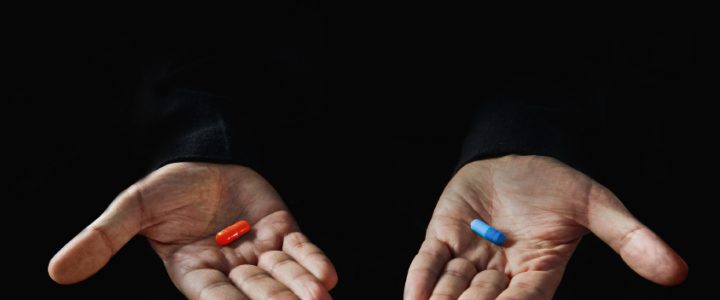
Administering a cholesterol drug alongside an antibiotic eases atypical behavior and restores the signaling balance in the brains of people with fragile X syndrome.
Read moreMetformin and Aberrant Insulin Signaling in a Fragile X Mouse Model
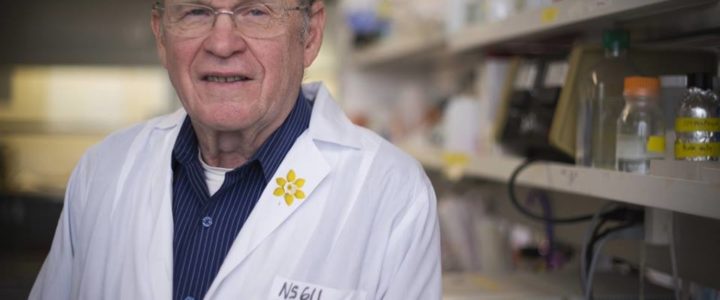
This 2017-2018 grant of $90,000 is funded jointly by FRAXA and the Fragile X Research Foundation of Canada for the first year. A previous FRAXA grant to the Sonenberg lab has led to great interest in the available drug, metformin, as a potential treatment for Fragile X syndrome. FRAXA is currently organizing clinical trials of metformin.
Read moreRinging the Bell at the New York Stock Exchange for Fragile X Awareness

FRAXA Research Foundation was honored to be part of the opening bell ringing ceremony at the New York Stock Exchange (NYSE) on July 5, 2018. We were there to raise awareness for Fragile X along side the National Fragile X Foundation. FRAXA President Katie Clapp and Director of Community Relations Dave Bjork attended with over 30 Fragile X family members and friends, including 4 self-advocates. This was a great opportunity to raise awareness of Fragile X on a big stage at an iconic place. The event was also carried live on television on CNBC, giving FRAXA and Fragile X broad reach around the world.
Read moreTetra Discovery Partners Initiates Phase 2 Trial of BPN14770 in Fragile X Syndrome
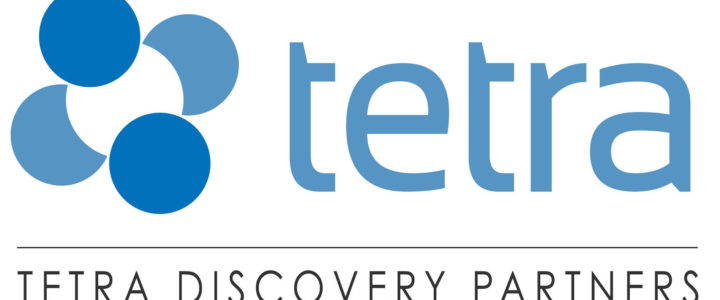
This 2-Period Crossover Study of BPN14770 is accepting adults males with Fragile X syndrome at Rush University Medical Center in Chicago. Principal Investigator of the study is Elizabeth Berry-Kravis, MD, PhD.
A selective inhibitor of the phosphodiesterase type-4D (PDE4D), BPN14770 has shown the ability to improve the quality of connections between neurons and to improve multiple behavioral outcomes in the Fragile X mouse model.
Aripiprazole as a Treatment for Fragile X Syndrome

Many medications are used to help people with Fragile X cope. But few clinical trials have been done on these drugs. Years ago FRAXA funded Dr. Craig Erickson to run a trial of aripiprazole (aka Abilify). FRAXA guest writer Hannah Miles recently caught up with Dr. Erickson to learn the results of the trial.
Read moreStudy Examines Behavioral Traits of Fragile X Patients Without Autism

Patients with Fragile X syndrome who don’t meet the cut-off for a diagnosis of autism show a decrease in impulsivity and repetitive questioning over time, when compared with patients who do, a new study shows.
Read moreDrug Repurposing Study Results Accelerate Progress Towards Fragile X Treatments

While there are over 8,000 rare diseases affecting an estimated 350 million people worldwide, only around 200 of these conditions have effective treatments. Due to the high cost of developing new drugs, rare diseases have historically been less attractive to pharmaceutical companies. Drug repurposing systematically leverages the detailed information available on approved drugs and reduces the time and money needed to deliver safe “new” treatments, but with greater success rates and a potentially more immediate impact on health care.
Read moreIn Their Own Words: Reports From the International Fragile X Workshop

The 18th International Fragile X and Related Neurodevelopmental Disorders Workshop in Quebec, Canada, was a great success, featuring Fragile X much more heavily than any previous meeting in this series! We asked our speakers to summarize their work in their own words, with brief updates from researchers investigating Fragile X.
Read moreBrain Imbalance Target of Dr. Erickson’s New Clinical Trial

According to Dr. Erickson, AZD7325 is a drug that selectively boosts GABA neurotransmission in the brain. GABA is the primary neurochemical in the brain that blocks brain activation. GABA activity is in balance in the brain with Glutamate activity, which is the primary neurochemical that causes brain activation. In Fragile X, GABA activity is insufficient and glutamate activity is excessive, likely causing brain activity to be out of balance. AZD7325 attempts to correct parts of this imbalance by boosting the insufficient GABA activity in the brains of people with Fragile X.
Read moreFragile X in the Forefront of International Conference

Today the 18th International Fragile X and Related Neurodevelopmental Disorders Workshop kicks off in Quebec, Canada. For the next six days, scientists from around the world will gather at this workshop to focus on recent breakthroughs in our understanding of Fragile X, autism spectrum disorders (ASD), and related neurodevelopmental disorders. This biennial meeting has been instrumental to the discovery of many disease-causing genes and the development of therapeutic strategies for these disorders.
Read moreMicroRNA Mediated Astroglial GLT1 Dysregulation in Fragile X

Almost all brain research focuses on neurons – nerve cells. However, the brain has many more glial cells which support, nourish, and protect the neurons. FRAXA Research Foundation awarded a 2017 grant $90,000 to support Dr. Yang’s studies of how changes in glial cells contribute to Fragile X syndrome. This grant is funded by a grant from the Pierce Family Fragile X Foundation.
Read more
